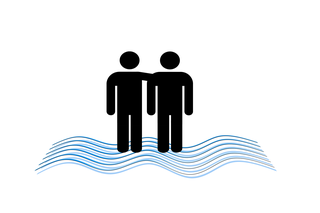Empathy
A Pandemic-Inspired Invitation to Help Us Build Empathy
Has the pandemic left you more aware of the suffering around you?
Posted April 12, 2022 Reviewed by Vanessa Lancaster
Key points
- There is growing evidence that evolution has wired humans with natural empathic abilities.
- To cultivate empathy, try actively listening, noticing facial expressions, and imagining what the other person is feeling.
- To gain a greater sense of empathy, you can challenge yourself to reflect on what faulty assumption you've held about a time you suffered.
“Welcome to my world!”
Over the past couple of years, I’ve been tempted many times to offer up just such a snarky retort in response to some comment or another about friends’ pandemic-induced anxieties.
They’ll talk about how overwhelming and pervasive their anxiety is, and I’ll nod my head. They’ll bemoan how uncomfortable it is to worry about getting or spreading Covid constantly and how difficult it is to navigate the uncertainty about the future.
Trying to keep the focus off of me, I’ll bite my tongue.
But, sometimes, when chatting with someone who knows my story, I’ll also hear something to the effect of “I think I have a better understanding of what those of you with anxiety disorders have to live with.”
Ding. Ding. Score one point for mental health awareness!
Replace “anxiety disorders” with “depression” or “social isolation” or “caregiving stress” or one of the so many other personal adversities, and I suspect a great many people have encountered similar new-found understanding of all kinds of challenges.
It’s called empathy, and I’m convinced it’s one of the very few “gifts” of this horrible pandemic.

Sharing the Same Boat
I recently had the opportunity to discuss this topic with renowned psychologist and author Stephen Hinshaw. Hinshaw, a professor at both U.C. Berkeley and U.C. San Francisco, has long served as an advisor for the nonprofit I founded–the A2A Alliance–and joined me as a guest on my “A2A Conversations” podcast.
Noting what we’ve all been through during the pandemic, Hinshaw told me he is hopeful that we might collectively develop more empathy for those with existing mental health challenges. Moreover, he’s optimistic that our shared experiences will reduce stigma as we realize that “we’re all humans in the same boat together.”
When it comes to understanding empathy and stigma, Hinshaw has written the book–two of them. In The Mark of Shame, he explores in depth their critical interplay. In Another Kind of Madness, he shares his own family’s experiences with the stigma surrounding mental illness and his determination to increase empathy through his remarkably candid writing.
Cultivating Empathy
It shouldn’t take a pandemic or mental illness or any other form of adversity to foster empathy–especially given the growing evidence that evolution has wired humans with natural empathic abilities.
So, how then do we cultivate empathy?
The short answer is … well, there is no short answer. There are several practical things we can do to that end, and the Greater Good Science Center has compiled an impressive list of them.
Among the ideas (and I’m paraphrasing):
- Listen actively.
- Pay attention to facial expressions.
- Contemplate what you have in common with others who might seem different from you.
- Actively imagine what others might be experiencing.
- Don't jump to conclusions about others' suffering.
An Empathy Challenge and Invitation
Here's a small challenge–a mental exercise you can tackle in no more than a few minutes–and a sincere invitation.
First, the challenge:
- Think of one thing you’ve learned about human suffering over this past couple of especially trying years (physical pain, isolation, loss, depression, anxiety, food or housing insecurity, lost opportunity, etc.)
- Ask yourself, What faulty assumption had I held about that suffering? (I thought I was too healthy to get sick; I’ll never be out of work; Mary could just stop worrying so much if she really tried, etc.)
- Commit to one small thing you can do to better understand that particular form of suffering. (Read a personal narrative about losing a loved one; ask your friend what it’s like to live with arthritis.)
I’ve been playing with this challenge myself, and I'm confident it can help all of us flex our empathy muscles.
This leads me to the invitation:
The next time someone's comment about a familiar form of suffering leaves you ready to blurt out, “Welcome to my world!" ... instead, pause. Take a deep breath. And make this powerful offer: “Tell me more about your world?”
That simple choice will make a world of difference!




